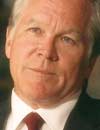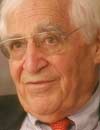- Floyd Abrams
First Amendment attorney - Lucy Dalglish
Executive director, The Reporters Committee for Freedom of the Press - James Goodale
First Amendment attorney - Bill Keller
Editor, The New York Times - Judith Miller
Freelance reporter - Norm Pearlstine
Former editor in chief, Time Inc. - Walter Pincus
Reporter, The Washington Post - Bob Woodward
Reporter, The Washington Post
Then there was something a lot more complex, and that was the impact of certain discussions I had with Mr. Libby's lawyer when I called him at one point basically to say: "What does he want? Basically, what does he want of her? What would he like her to do?" And the answer at first was: "We've told everybody that they can testify, every journalist. That's the same with her as well. And we signed the form. He signed the form."
I said, "Well, wasn't the form coerced?" And the answer was: "Oh, of course the form was coerced. How could it not be coerced? He'd be fired unless he signed the form." Well, that, to me and to Judith Miller and to the folks at the Times, sent conflicting messages. Were they saying yes because they had to say yes, so they could tell Fitzgerald that they said yes? Or were they saying yes because they meant yes? That was always a problem.
One of the real problems here, which I came to think about much more after the fact than during the discussions, I started to ask myself, what is it I would expect a lawyer for Mr. Libby to say? What is it that he could say? Could he say, "Mr. Libby would like her to keep to her promise of not disclosing anything about their conversations which is attributable to him"? There's a problem with that. The problem is that may be obstruction of justice, a statement as clear as that. ... So I started to think to myself, well, he's not allowed to say, "No, don't talk." How much can we make of the fact that he initially said, "Yes, do talk"? What is the reality in this type of situation?
It was that that, in fact, wasn't really resolved from Judith Miller's point of view until she'd been in jail over 80 days. And the subject came up again of the voluntariness, and she finally said: "Look, I am not going to testify based on some writing of his which he was forced to say, and I'm not going to testify based on anything that his lawyer says to you. I know him. He wants me to testify, have him pick up the phone and call me. Have him visit me in prison and persuade me that that's what he wants me to do. Otherwise I won't do it."
Eventually that led to a phone call and a letter from Libby to her, and that's what was the final bit of persuasion, which finally had her agree to testify and to get out of jail.
OK. So when Mr. Libby's lawyer says, "I told Mr. Abrams that the waiver was voluntary"?
That is not true.
He's lying?
He told me that the written waiver was involuntary. What he did tell me at the beginning of our call was that it was satisfactory to Mr. Libby for her to testify.
He did say that.
He did say that to me.
A year before she went to jail.
Maybe not a year, but sometime before she went to jail. But that was the same conversation in which he also said that the written waiver that he had signed was involuntary, was coerced by its nature. And that is what led to a great deal of difficulty in making a decision as to whether to accept or not to accept the notion that he was really waiving confidentiality.
Did you call him back and say, "We're confused about what you meant"?
I didn't call him back because something else happened then. What happened then was that I needed two parts to solve this problem. I needed him to say it was OK in a persuasive way for her to testify, and I needed Mr. Fitzgerald to give me a level of assurance that even if she testified about Libby, that that would be the end of the matter, because it had not been the end of the matter with Matt Cooper. Fitzgerald had said to me basically, "Why don't we have a deposition of Cooper limited only to this one source, Libby?" And we finally agreed to that. And we had the deposition. He had reserved, as he had every right to do, his right to start all over again if he wasn't satisfied with the answers.
Time was already in contempt; Cooper was already in contempt. So we had this deposition. The effect of the deposition was he gave the deposition, and at the end of it we went to court. The contempt findings were lifted.
Then a few weeks later he said: "I've got to start again, because there's another source obviously that I don't know about. And since there is another source, I'm going to issue a new subpoena and start all over again."
Well, that was precisely what Judy Miller did not go through. If she was going to do a Libby-only deposition, she wanted a level of assurance that that would be it. At that time Fitzgerald was unwilling or unable to give that sort of promise, so we couldn't have the deal anyway. ...
There was another factor, too. All these discussions occurred early on in the case. We hadn't been to court yet. These discussions were to see if it was possible to avoid any legal battle at all.
It was certainly Judith Miller's view that absent the clearest sort of waiver, the most unequivocal sort of waiver, that we should fight the good fight; we should do whatever we could to protect her sources. Her view from the start had been different from that of certain other journalists.
Well, certain other journalists are [NBC's] Tim Russert, [The Washington Post's] Walter Pincus, others; Matt Cooper to a certain extent.
Look, different journalists have different views and different relationships, and different employers as well. Tim Russert had lawyers who went to court for him to fight the subpoena in the first instance, as did Matt Cooper. Other people may have had less discussions with sources about this or what they viewed as completely irrelevant --
Yeah, but you can't be sort of half pregnant when you're dealing with a criminal grand jury.
Yeah, I think that's a strong argument. But look, there were others who thought that they had acted -- particularly some lawyers -- very smartly by avoiding all this.
Bob Woodward kept quiet.
There were a lot of different ways of reacting to this. My point is only that from the start, Judy Miller's attitude about this was this was a confrontation brought about by Fitzgerald's insistence on pressing the point with journalists in a way that it had rarely been pressed before. . And that it was important for at least someone to stand up and fight even if she wound up losing. ...
Mr. Cooper -- explain why didn't he go to jail.
Mr. Cooper didn't go to jail because on the very day that we were having the final hearing, his criminal lawyer, who then came to be much more active in the case, ... had a discussion with Karl Rove's lawyer, which led Matt Cooper to conclude that he did have a genuine waiver from Rove to testify. And so he did.
Remember, he had already testified about Libby. The only question that was open is what would he say, if anything, about his discussions with Rove. And he was satisfied, based on his lawyer's conversations with Rove's lawyer, that he could testify, so he did not go to jail.
The only reason that I'm pushing on this particular area is that first, we have a disagreement between Mr. Libby's lawyer, Mr. [Joseph] Tate, and you about what went on. That's first. Second, Matt Cooper is able to get a waiver on the eve of sentencing, if you will, by contacting the lawyer and being satisfied. Why didn't somebody go back to Mr. Libby's lawyer and say: "Look, where are we? Stand up in public. Tell her to testify"?
The question of going back raises another related issue, which we spent a lot of time talking about, and that is, when does going back to the source amount to such pressure on the source that you're violating your obligations by the very fact of asking again and again? It's a very delicate relationship between journalist and source. ...
Matt Cooper. Matt was called twice. And I think he learned his lesson in a very difficult way. The first time he was called to testify, he refused and went back and got an agreement, I think it was with [then-Chief of Staff to Dick Cheney] Scooter Libby, to testify.
Says he called him and said, "Hey, can I testify?" He said, "Yeah, fine," so he released him. They cut a deal with Fitzgerald: "All you want to talk about is Libby? OK, fine, we'll talk about Libby." He goes, assuming he's going to be off the hook; he's complied with the subpoena. ... A few weeks later he gets another subpoena to come back and do it all over again. Of course, we later found out it all had to do with Karl Rove. Matt came to the conclusion: "What am I supposed to do? Am I just going to keep coming back here indefinitely?"
[NBC's] Tim Russert was subpoenaed in that case as well. He was in a completely different position. They wanted to know what he had told a source, what he had said to Scooter Libby, not what a source told him.
Now, all of these scenarios are very, very difficult to explain to other reporters, to lawyers, to judges, to citizens, to readers. Wait a minute -- what is this? A reporter gets a subpoena, they don't cooperate, right? Well, unless, unless, unless. Every single one of these folks who was subpoenaed in connection with that case had a slightly different, wacky set of circumstances.
What did [Washington Post national security reporter] Walter Pincus agree to?
… Walter, my recollection is, decided that what was confidential was the identity of the source, not what the source said. So they allowed him to craft a deal where he testified as to the substance of the conversation, but did not identify who the conversation was with. Now, apparently Fitzgerald was OK with that because he knew who the conversation was with, because they had Walter's phone records.
Each one of these situations was slightly different. And let me tell you, it was torture having to try to explain this to the American public as to why all of these decisions were being made.
And then Judy Miller decided, "I'm not playing ball at all."
Judy Miller was in a situation where she ultimately had two sets of lawyers. The one set of lawyers which, I think, probably was more representative of The New York Times' position, wanted, I think-- was ready for her to hang tough. She also had a personal lawyer who had a criminal background who really believed that his job was to get his client out of jail and really believed that he was representing Judy as a person, not The New York Times, and I think strongly encouraged her to come to some sort of agreement. So you had all of these different scenarios playing out. It was a mess.
Therefore you hated this case.
I hated this case. ...
... When you see reporters testify -- for instance, in [the Valerie Plame CIA leak] case, when you see reporters making deals with the special prosecutor, "I'm only going to testify so far -- "
Right. What do I think? Well, if I had a BB gun, I would like to shoot them. I think they're doing a great disservice to the press, all the reporters that are testifying.
You want them to go to jail?
Not under every circumstance. But ... we're talking about government against newspaper cases? ... I think that jail should be considered. I think we would have been much better off in the Judy Miller case had [NBC's] Tim Russert, had [Washington Post national security reporter] Walter Pincus, had [Time magazine reporter] Matt Cooper -- although Matt Cooper had a great fight -- and Judy [Miller] all four gone together off to jail. ... And Bob Woodward, symbolically. If all five of them had gone off to jail, that would have been very, very, very helpful to reporters.
Because you think civil disobedience by reporters will make a difference? You equate this with the civil rights movement, I guess?
I think that's right. You take this only so far, and not every case is the same as another. We know you've got a zillion forms of reporters being asked to testify. ... Don't go to jail if you saw a fire, you know? But you might argue, "Find out somebody else before you make me testify." ...
[Former Time Inc. editor] Norman Pearlstine turned over all of Matt Cooper's notes.
Disgraceful, absolutely disgraceful. I've talked about this with Norman. We have a civilized disagreement. I would say Norman Pearlstine is -- or was at the time he turned these over -- the editor in chief of the Time magazine division, which has a zillion titles. He is in a very difficult political position in real life because he has to go to his board of directors, who are not First Amendment-niks, ... and maybe not even media people who know a lot about media, and tell them that he's going to go in civil contempt. I think as a practical matter, that is very difficult for him. But from my point of view, it is very, very bad that he did what he did.
... Some prominent reporters, particularly in television, over the last 15 years have testified before federal grand juries.
I know of one. I was disappointed. I don't think they should have done it. ... I'm glad you said the last 15 years. One thing we haven't talked about is that I'm sitting here as the veteran of 30 years ago in the Caldwell case, and there's been a change in the attitudes of the press toward testifying and giving up sources. It's not as militant, in a nice way, as it was 30 years ago, and I'm not happy with that.
We've gotten soft?
Yes. The press has gotten soft. ... I think the press is under huge pressure with respect to the Internet and everything else, and as a consequence, it's more difficult to take on a huge fight like this for them -- in a real sense. ... When you have 6 million bloggers picking on a mainstream media, that is going to take some of mainstream media's energy to deal with that, OK? …
Even though many parts of the empire are declining, the proper strategy, in my view, would be to stand up and fight, because that will make you important forever and enable you to survive. Now, [that] may be a tough sell to the accountants that are looking at the readers who are going on the Net, so forth and so on. But honestly, I don't think you really want to have mainstream media that doesn't stand up and fight. ... Someone ... has got to stand up to the government. Someone has got to stand up for these institutions. And part of that process is fighting these subpoenas.
How did you feel when other people were making deals, saying, "I'll go in and testify this much," or, "I'll go in and testify because I don't really think I know anything," and now everybody's winding up being witnesses in a criminal trial?
At the time I felt that there was a failure of spine on the part of the journalism community at large. I think in hindsight, when we finally ended up relenting and Judy ended up testifying, I felt like we may have been a little too quick to charge out on the limb and vociferously defend the principle. Part of me that wonders whether we might have gotten a deal at the beginning comparable to the one that we got at the end and Judy could have been spared a long jail sentence.
Norman Pearlstine, [former editor of] Time magazine, said that he gave up Matt Cooper's notes from Time magazine's e-mail files because a corporation, he says, cannot be engaged in civil disobedience. Do you agree?
Norm, I think, did what he did after a lot of anguish and soul-searching, serious thought, but his position was very much different from ours. Fortunately, we were not in the position of having the possession of relevant materials, so the Times as a company wasn't sued. I still think that had we been in that position, we would have fought on the notes, but it's awfully hard to say when you aren't actually in that position. ...
Many of your colleagues made different decisions than you did. Mr. [Tim] Russert [of NBC], Mr. [Walter] Pincus [of The Washington Post], they decided to cooperate. …
… Every reporter must make his or her own decision about whether or not they're going to cooperate in such an investigation. But I think that unless all sources or potential sources know that a reporter is going to protect them, they won't come forward with information. ...
You say you were surprised when you got a subpoena.
Yes. I was surprised that the special counsel felt the need to go after journalists. I recognize in areas involving confidential sources, quite often the reporter and the source are the only two people who are likely to have that information, so it isn't as though there are lots of third parties you can go to. But nonetheless, since I didn't know that there was a law that had been broken, I didn't know why we'd received a subpoena.
You weren't alone, though.
No. There were a number of people who received subpoenas: Tim Russert at NBC; Glenn Kessler and Walter Pincus at The Washington Post; Judith Miller at The New York Times. Those are the ones we're aware of. I don't know whether Novak received a subpoena or not.
When you get a subpoena like that, and others reveal that they've gotten subpoenas -- you know many of those people; it's a small world -- do you get together and talk about it? You've all gotten subpoenas for the same investigation.
We didn't in this case. The way things played out actually at the time that Matt Cooper got his subpoena, we were trying to figure out what they were looking for, and initially we resisted that subpoena, as we typically would, in an effort to protect our sources. It turned out that they were particularly interested in Matt's conversations with [then-Chief of Staff for Dick Cheney] Scooter Libby and that those conversations, in our view, were probably exculpatory.
Matt didn't think that Libby had told him [anything] that led to the outing of Plame. So Matt's and our lawyer, Floyd Abrams at that time, had a conversation with Libby's lawyer that said, "Given that Matt would be willing to testify that Libby did not say anything about Plame by name, did not identify her, would you be interested in his testifying before the grand jury?" We got what we thought was a personal waiver that was different from the waivers that Bush had compelled all of his White House people to adhere to. ...
As you know, after Matt testified about his conversations with Libby, the special counsel came back to us and said: "Well, on the basis of your testimony, we think there's some other sources we'd like to know about. So despite the fact that you've testified for three hours, we'd like to still bring you in to talk to the grand jury under oath again." And we again resisted that. ...
Well, I guess the question is, looking from the outside at least, when you're dealing with a prosecutor, especially a special prosecutor, and one with a reputation for being aggressive and thorough and tough --
He is all that.
-- don't you want, as the news media, to approach him in some unified way?
There are a couple issues with that. One, we didn't necessarily know who else he was talking to. We'd heard that he'd interviewed scores of people, so I didn't know whether that involved a lot of reporters or just a few.
Secondly, the kinds of information that he was seeking didn't necessarily show a pattern. For example, Judy Miller had never written anything that we were aware of, so we couldn't quite figure out what the interest in Judy Miller was. Tim Russert's statement following his testimony suggested that he was asked what he had told Libby, and at the time I thought that was a typo. I didn't understand that that was actually significant, because I couldn't figure out what Russert would have to tell Libby or why that would be of interest to a special counsel who was trying to figure out who had outed Valerie Plame. ... The Washington Post was pretty vague about what Kessler and Pincus testified to, and to this day I'm not exactly sure what they've talked about. ...
I guess what I'm getting at is that it appeared that each newspaper, each individual within that, or broadcaster, was sort of trying to deal with Fitzgerald on their own. ... Doesn't that weaken your position, because if you had all gotten up, the thought is, and [said], "We're not cooperating in this kind of fishing expedition where we can't figure out what you're after until you define what it is you're after"?
Yeah. Well, with the benefit of hindsight, you may be right. That did not cross any of our minds at the time, I think, because we didn't really have enough of the sense of where the investigation was going.
The other thing that we've all had in the back of our minds and we've all had to deal with is, as much as you want to keep your sources confidential, we know that there's a Supreme Court ruling from 1972 [Branzburg v. Hayes] that's never been overturned, where the Court has specifically ruled that when it comes to a grand jury, journalists don't have any privilege. So the question of how you respond to a subpoena to appear before a grand jury becomes one that I think we all end up having to take pretty seriously. ...
Because of this Supreme Court decision, you gave up Mr. Cooper's notes.
That's correct. Is there a question?
Well, some people think that by doing that, you made the general defense of confidential sources and information related to those sources and the possession of the employer, the owner, much more difficult.
First of all, I think one has to distinguish the Judy Miller case from our own in that The New York Times was never held in contempt. It was subpoenaed initially but said it had no documents, so they were not in the situation that Time Inc. was in of having been held in civil contempt.
Secondly, there was an institutional issue in that our reporter had put Karl Rove's name, his source, into an e-mail that several dozen people had access to. And that created institutional issues for us. And where I think that [former New York Times counsel] Jim [Goodale] and I have a disagreement is that I think it's very difficult for corporations to engage in civil disobedience and Jim believes that it's a First Amendment obligation of publishers to do so.
It was not a happy day to turn over the notes to the special counsel. I've said that it's the most difficult decision I've had to make in more than three decades in journalism, and I say that with the understanding that lots of people whom I respect and admire would disagree with me. ...
You didn't think there was an option for the corporation to simply say, "We're not complying"?
Well, first of all, I'm unaware of any case, really in the last several decades, where any media company has defied a Supreme Court decision. And I consider the denial of cert, the refusal to hear our petition, as the equivalent of a Supreme Court decision. Supreme Court ruled that Branzburg still was in place, that reporters do not have a privilege and that we therefore could be held in contempt.
Then the second question is, do you defy the Court and say, "This is civil contempt. The purpose is to coerce. We're going to ignore that contempt citation"? I did not think in this case that was the appropriate way to go. ...
Here's what we asked [former New York Times counsel] James Goodale: "Mr. Pearlstine turns over all of Matt Cooper's notes." And he says: "Disgraceful, absolutely disgraceful. I've talked about this with Norman. ... I would say Norman Pearlstine is -- or was at the time he turned these over -- the editor in chief of Time's magazine division, which has a zillion titles. He was in a very difficult political position in real life because he had to go to his board of directors, who are not First Amendment-niks," as he put it, "and maybe not even media people who know a lot about media, and tell them he's going to go in civil contempt. I think as a practical matter, that's very difficult for him."
Well, as usual with Jim, a little learning is a dangerous thing. I never went to the board. I never went to the CEO of Time Warner. I never went to the CEO of Time Inc. I made the decision on my own in my capacity as editor in chief of Time Inc. under a document called "The Role of the Editor in Chief" that I wrote in 1997, that was approved by the CEO and the board of Time Warner.
I have an extraordinary level of editorial independence, and it was my independent decision that, in these circumstances, the appropriate thing to do was to turn over our notes after the Supreme Court denied our cert petition. The reasons for that are several.
I think that even The New York Times, if not necessarily Jim Goodale, would acknowledge that a reporter's privilege is not absolute in its editorial. When Judy Miller went to jail, it said that when troop movements were known, for example, a confidential source might not be respected. We have examples of journalists who have made independent decisions to reveal confidential sources; [for example], Jon Alter, when he thought that Ollie North was lying about tactics involved in capturing the Arabs who had thrown [wheelchair-bound Jewish passenger] Leon Klinghoffer overboard on the Achille Lauro.
Once you've decided that the privilege is not absolute, it seems to me that you have to apply a balancing test as to when you decide to adhere to a Supreme Court decision and when you decide you want to defy it. In this particular case, involving a grand jury, involving a question of national security, involving White House officials who are not traditional whistleblowers, but if anything, were trying to undermine a whistleblower and a situation where the name of the source was in our e-mail and available to several dozen people within Time Inc., it seemed to me that, as an institution, we had no choice but to turn over our notes in this case.
But it's not for the reasons that Jim suggests. There was no corporate pressure. ...
And the fact that it's a publicly traded company, that you have shareholders that the company has to answer to in one form or another, and that you might be threatening some of the profitability of the company if you were to resist, not just in fines, but possibly additional sanctions from the judge, that didn't enter into your mind?
Well, first of all, I made a decision based on a civil contempt citation. I think the kinds of things that Jim is talking about might prevail if criminal contempt were the issue. If there had been a trial on criminal contempt and we were found criminally liable, then I think you probably, as a publicly held company, ... would require resolution from a board of directors before you could defy a court. …
I think, personally, that sophisticated investors in media, which would be the large institutional investors, assume that one of the costs of doing business for a media company is that you vigorously defend yourself in litigation, be it civil or in a case such as this.
Frankly, the financial exposure never entered my mind. I think it would have been relatively small for a division of $5 billion in revenues and that we could have withstood the financial penalties if that were the issue.
I didn't think that was the issue. I do think there's an issue of institutional accountability. I do believe that corporations have a very difficult time justifying engaging in civil disobedience. It's different from an individual's right of civil disobedience, and I think that, for the reasons that I've articulated, that this was a case where the right thing to do was to turn the notes over to the special counsel.
... Explain to me what happened with you in the Plame case?
In the Plame case, I refused to identify my source. I had written in the paper that a source had come to me and had, in the midst of a conversation, suddenly diverted -- I was doing a story about weapons of mass destruction in July of 2003 -- and said: "Why do you keep writing these stories about [former Ambassador] Joe Wilson's trip [to Niger]? Don't you know that his wife is an analyst who arranged for the trip and it was sort of a boondoggle? That's why we're not paying attention to it."
I didn't think it was true at the time, because I had written about Joe Wilson a month earlier, talked to everybody who was involved, and not one person mentioned his wife. The CIA still says she did not arrange the trip, despite what the Senate Intelligence Committee said, and the record seems to prove that, so I never wrote about it.
But when it became a criminal case, I decided the reason they had done it to me was damage control. I didn't think it violated the [agent] identification act.
That makes it illegal to --
Put out the name of an agent. This is one of the results of getting a law degree a couple of years ago. I think I know the law -- not enough to defend myself, but I didn't think it was a violation of the law, and I thought the public ought to know that it was damage control.
So I wrote about it, knowing I could very well get caught up in the whole thing. Eventually I did. When we were approached, the paper was approached by the prosecutor, Patrick Fitzgerald, and they wanted me to testify. I said I wouldn't. They approached us with waivers --
These signed waivers that they made everyone sign.
Signed waivers, yeah. And we didn't accept that. My position was that until my source either came forward publicly or came forward to the prosecutor I was not going to testify, and that was it.
Subsequently, through lawyers, we were told the source had come forward, had identified himself as the one who talked to me about it, and had released me to talk to the prosecutor about it if, at the same time, I never mentioned his name publicly. And I never have.
But you did testify?
I gave a deposition, yeah.
But you did testify?
I gave a deposition. Yeah.
Well, which is testimony.
Yeah. Didn't go --
Sworn testimony.
-- to the grand jury. It wasn't as dramatic as all that. Sat in a lawyer's office with my own lawyer sitting right next to me.
And you've talked about what the source said to you?
I didn't have to talk about what the source said to me because I had printed exactly what the source had said to me. And I was never asked to identify my source, and I never did. ...
So what is that? That was to save you from losing your virginity or something?
Yeah. It's something I felt very strongly about. But I also feel strongly that once your source has disclosed, whether it's the prosecutor or publicly, there's very thin ground for you to say, "I'm not going to talk about it."
Protecting the identity of the source to me is the main thing, because the source has talked to you about something he or she wants public, and in my case, I had published it. So the substance of the conversation wasn't the issue; the identity of the source is the issue.
[Editor's Note: On Feb. 12, 2007, Pincus revealed in testimony for the defense at the trial of Lewis "Scooter" Libby that he first learned the identity of CIA agent Valerie Plame on July 12, 2003 from then-White House press secretary Ari Fleischer. According to The Washington Post, Fleischer gave Pincus permission to reveal his identity in the week before Pincus testified.]
Same issue in the Wen Ho Lee case. We have never disclosed who the sources were [for] the stories I wrote about Wen Ho Lee. And the paper paid a lot of money to stop that case because we felt we would lose. But again, I protected the sources.
But once you step into the prosecutor's lair and you say, "I'll testify," whatever the agreements are on paper when you go in there, they don't necessarily stop the prosecutor from continuing the questioning.
Yeah, it doesn't mean you have to answer it.
So at some point you would have drawn the line?
We did draw a line.
But if he'd said: "That's not enough. You just said something that now is new, I didn't know. I need to know more."
I would have said that's not part of the deal and I'm not going to talk about it.
Would you go to jail?
Well, then you go through the process all over again. Depends on what he's asking and what he wants.
So it's a conditional promise?
Yeah. I mean, this is serious business. You're getting into legal matters. To me it's the front end that counts; that the reporter has to be careful about what he's doing, and the substance of the facts of the story have to justify getting into this mix.
One of the real problems about journalism now is that we have been giving confidential status to people giving us all sorts of trashy information: "Britney Spears is pregnant. Don't tell anybody I told you." That's at the same level as "We're going to invade tomorrow." You've got a confidential source. The public doesn't understand the difference, but there is a real difference. ...
You're talking about gossip versus, let's say, life and death or national security?
Yeah. Serious, factual information that makes a difference.
And the two have been mixed together?
In the public's mind, it's all the same thing. ...
I just want to understand what happened in the Plame case with you and just get this a little clearer. You had this kind of strange testimony you gave where you never mentioned your source's name --
Right.
-- but you talked about what your source told you?
No, I didn't even have to talk about that, ... because I had written exactly what was said [that was] relevant to the investigation in the paper. What they wanted to get down was, was this the only time I talked to that person; how long the conversation was; the circumstances of how it came about; had I talked to that person subsequently? ...
I had talked to [former Chief of Staff to Vice President Dick Cheney] Scooter Libby on a background basis prior to that, and I had been given a waiver by Scooter Libby. But in my conversation about Wilson's trip with Scooter Libby that took place in June, a month earlier, Wilson's wife was never raised.
But once a reporter walks into a prosecutor's office or into a deposition controlled by a prosecutor, don't you become an arm of law enforcement at that point?
Well, you're a citizen like everybody else. ...
You're an independent fact gatherer.
Right. ...
Exactly. So once you agree to testify, aren't you stepping across a line?
No. If your source has come forward and your source has given his side of the story, then you're a citizen like everybody else.
But then you become a potential witness against your source.
You're a citizen like anybody else. I think the press trying to make itself different -- I mean, this is part of my quirky nature. When we were subpoenaed, we did not, in either Wen Ho Lee or the Plame [cases], we did not move to quash the subpoena.
My belief was that you find out what they're going to ask you, and if you don't want to answer, you don't answer. But also what goes on in these cases is there's a lot of discussion that goes on before you reach the walking-in phase, negotiations back and forth. People don't realize that in criminal cases, it goes on all the time. Negotiation for testimony, discussion about testimony, what's going to be asked -- a lot of that is done ahead of time, in all sorts of cases.
But I have a very strong belief that although we are reporters and we're gatherers of fact and all the rest of it, we are a citizen like everybody else. ...
One side of the story is the WMD story. The other side is the injection of Patrick Fitzgerald into the investigation. He comes up with waivers, a new tactic by prosecutors to get the confidentiality agreement between reporters and their sources broken so that law enforcement can subpoena reporters. And he successfully gets all the reporters involved, eventually Judy Miller and yourself, to testify.
He didn't get me to testify, no. See, that's where --
Well, Armitage never gave you up?
But he didn't give me up. I mean, I'm the reporter; I never gave Armitage up. He went to the prosecutor and said: "Hey, look, Woodward called me and said I told him this. He gave me a waiver." It wasn't just a waiver; it was a request: "Please testify. I urge you to testify. I almost beg you to testify." So I wasn't giving anyone up; he wasn't giving anybody up.
Well, but the ultimate end here is that the reporters all testify.
Yeah, right.
And now we have Patrick Fitzgerald in court in New York getting the records of The New York Times in a completely separate story. We have him getting Judy Miller to testify in a separate trial in Chicago related to a terrorism case [involving mosques accusing of financing terrorism]. And we have the Justice Department in general, if you will, more willing to subpoena reporters, whether in San Francisco over BALCO and elsewhere. So it's had a significant change in the behavior of the Justice Department, if not the administration as a whole.
OK. But the "it" here is a whole series of things and an attitude. My point is that I think it's a serious public policy mistake by the Bush administration and prosecutors to do this, and it will reap bad things. It will make it more difficult for us to do our job. Suppose it turns out in this administration or another administration something really bad goes on -- not necessarily criminal, but in the national security area or the kind of things we saw in the Nixon administration. You need be able to get at that, and you need the confidential sources. If we can't establish those relationships of trust, if it's more difficult, we're not going to get there. We're not going to get there fast enough.
Now, as all of this has washed out, I know I can still function with confidential sources, have those relationships of trust, and in a practical sense, it has not hurt my ability. In my latest book, I have all kinds of notes of classified meetings, classified documents, private conversations on sensitive intelligence matters and so forth.
So I'm able to function. The question is, can you do it for a daily newspaper or television station? Can you get it really fast enough? And speed is important. And they're slowing down the process.
They are slowing the process down?
They are slowing it down. But I don't think in-depth reporting has been dealt a fatal blow by any means.
![News War [site home page]](../art/p_title.gif)















